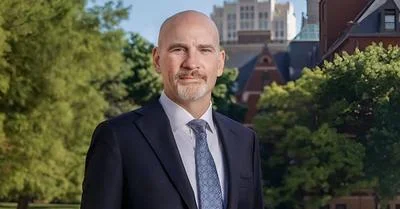Jackson Hataway, president and CEO, Missouri Bankers Association, left, and U.S. Sen. Josh Hawley (R-Mo.) | Missouri Banker's Association (Facebook) | Senate.gov
Jackson Hataway, president and CEO, Missouri Bankers Association, left, and U.S. Sen. Josh Hawley (R-Mo.) | Missouri Banker's Association (Facebook) | Senate.gov
A spokesperson for the Missouri Bankers Association (MBA) said an analysis released earlier this month shows that proposed federal credit card regulations backed by U.S. Sen. Josh Hawley (R-Mo.) would be "bad policy" for the state's banks and consumers.
That analysis, released Jan. 8 by the Electronic Payments Coalition (EPC) and Oxford Economics Research (OER), showed the so-called Credit Card Competition Act could lead to a loss of $227 billion in U.S. economic activity and 156,000 job losses.
“This study confirms what we already know — this legislation is bad policy for consumers and banks,” Jackson Hataway, MBA president and CEO, told Show-Me State Times. "We are adamantly opposed to this bill because it will pull credit from the market and create a roadblock for businesses seeking to expand their operations."
“It also makes it extremely difficult for small community banks to offer cards, essentially pushing them out of the market for issuing cards,” said Hataway. “In addition, the bill exposes every credit card user — both consumers and business owners — to detrimental security risks.”
Originally sponsored by U.S. Sens. Richard Durbin (D-Ill.) and Roger Marshall (R-Kans.) in 2023, the legislation would require banks to offer merchants at least two network options, one of which cannot be Visa or Mastercard, for processing credit card transactions. Opponents to the bill argue that if given the choice, retailers would likely choose cheaper, less secure networks for processing transactions, thereby exposing consumers to increased securities and fraud risks.
Hawley joined as a co-sponsor on the bill in February 2024. The legislation has not, as yet, been re-introduced in the current Congress.
The bill could result in a $227 billion loss in economic output over approximately four years, driven by a 100 basis point reduction in interchange and an $80 billion decline in discretionary spending, according to the OER study, with regions reliant on travel and recreation spending projected to experience the greatest economic impact from the proposed policy.
OER is a global advisory firm that provides economic forecasting and analysis. The company was founded in 1981 as a commercial venture with Oxford University’s business college. It offers research on economic trends, policy, and industry performance for governments, businesses, and financial institutions. The firm operates offices in various regions, including North America, Europe, and Asia. Oxford Economics produces reports and data covering global and regional economies, industries, and markets.
The EPC is a trade association that represents credit unions, community banks, and payment card networks. The coalition advocates for policies that protect and promote the use of electronic payments.
MBA is a trade organization representing financial institutions and banking professionals in Missouri. Established in 1891, the association advocates for banking-related policies and provides educational programs, compliance resources, and networking opportunities for its members. The organization is headquartered in Jefferson City, and its membership includes community banks, regional banks, and national financial institutions operating in the state.





 Alerts Sign-up
Alerts Sign-up